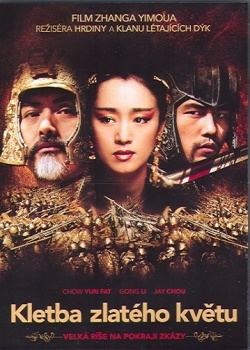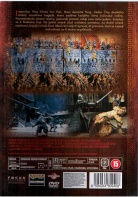Curse of the Golden Flower
The plot is based on Cao Yu's 1934 play Thunderstorm ( pinyin: Lei Yu), but is set in the royal court of a certain dynasty in ancient China. On the eve of the Chong Yang Festival, golden chrysanthemum flowers fill the Imperial Palace. The Emperor (Chow Yun Fat) returns from his various military campaigns with his second son and general, Prince Jai (Jay Chou). It is hinted in their brief but intense sparring session, that Jai has grown resentful towards his father and his controlling ways. However the Emperor is not afraid to warn the Prince of his past mistakes and that he shouldn't take anything of the Emperor's that is not given to him. The Emperor's pretext is to celebrate the holiday with his family, but given the chilled relations between the Emperor and the ailing Empress (Gong Li), this seems disingenuous. For many years, the Empress and Crown Prince Wan (Liu Ye), her stepson, have had an illicit liaison. Feeling trapped, Prince Wan dreams of escaping the palace with his secret lover Jiang Chan (Li Man), the Imperial Doctor's daughter. Meanwhile, Prince Jai, the faithful son, grows curious and then worried over the Empress's health and her abnormal obsession with golden chrysanthemums. Wan agrees but the younger son, Yu seems oblivious to the matter and does not question it further.
The family reunites over the chrysanthemum terrace in which Wan's request to explore the frontier is denied by the emperor, along with Yu's request to command the imperial guard. It is decided that Jai will take that responsibility. It is shown that no one cares or really sees the youngest son Yu, and he is quietly dismissed. It is then shown that the Empress had failed to take her full dose of medicine at a required hour. The Emperor commands she take the full dose. The Empress refuses, knowing that something is not right. The Emperor instead commands the sons to make her take her dose to which she begrudgingly acquiesces after much coaxing from Wan and Yu. Jai also begins to sense that something is afoot.
For ten days, the Emperor had ordered the Imperial Physician, Jiang Yiru (Ni Dahong), and his daughter Jiang Chan to secretly add poison of tiny amounts into the medicine that the Empress takes one dose of every two hours. This will eventually cause her to go insane, a sight that the Emperor would very much like, according to the Empress, who knows that her husband has grown tired of her strong and independent character. Feeling even worse after taking the medicine, the Empress sends a woman-in-black to find out the truth for her. The Empress's worst fears are confirmed but she continues to embroider, deep in planning. Confirming the Emperor's plans, the Empress summons Prince Jai, revealing to him her plot of rebellion and asks for his participation. Jai hesitates, saying that it would be difficult for him to confront the Emperor, his father, with sword and armor; but after seeing his mother has to take a poisoned dose before him, he agrees.
The woman-in-black was captured by Prince Wan and taken to the Emperor, and it was revealed that she was Jiang Shi (Chen Jin), Jiang Yiru's wife, Jiang Chan's mother, and also the Emperor's previous lover. Everyone was led to believe she had died. But the fact is that Jiang Shi had escaped the Emperor's previous attempt of killing her, and was later saved by Jiang Yiru from dying, and then married him. When the Emperor senses a looming threat from this, he relocates the doctor's family from the Palace to a remote area. Prince Wan runs after them to see Chan, and senses that the Empress was plotting something from the information that Chan provides him with, and hurries back to the Palace. He confronts the empress in a rage, claiming that everyone will blame him for the rebellion. The Empress, already losing her mind, bluntly claims that she just wants Wan to die and continue with her plan. Wan, in a panic, stabs himself and is put under care. The Emperor comforts him, revealing that he knew about his son's affair with his wife but is confident that it was she who seduced him.
Meanwhile, while the doctor's family are en route, mysterious assassins-in-black attack them, and kill Jiang Yiru. Chan and her mother are forced back to the palace on horseback. Their return sets off a tumultuous sequence of dark surprises. Amid the glamour and grandeur of the festival, ugly secrets are now revealed: Jiang Shi was actually the mother of Prince Wan, meaning his secret lover, Chan, is in fact his half-sister. Realizing this, a shocked and crazed Chan flees the palace, screaming in madness, with her mother chasing behind. Both are killed by the assassins-in-black, who wear the same clothes and armor and use the same weapons as the ones that previously attacked the family en route.
After the turmoil raised by Jiang's Family, to everyone's astonishment, the youngest Prince Yu abruptly kills Prince Wan, and attempts to oblige the Emperor to abdicate the throne to him. He confesses that he also learned of the plot of the Empress and Prince Jai, and feeling that no one had cared about him, he had to act in advance to gain himself the throne. The Emperor's assassins-in-black eliminate Prince Yu's tiny rebel force easily, and the Emperor lashes Yu to death. The Empress, already caught in madness, does not seem to notice the violence and walks off, consumed in her plan.
As the Imperial Family continues its elaborate charade in a palatial setting, ten thousand golden armored warriors all wearing the embroidered flowers the Empress made, are sent by her to charge the palace. Prince Jai is the commander of the army and ignores a warning, the Imperial banner his father had told the family about previously in the chrysanthemum terrace, that his father has placed. As they charge forward, the Emperor's personal assassins attempt to stop them. Although Prince Jai's men take various casualties, they manage to eliminate all the assassins and move forward. As the golden-armored army marches into the imperial square, they are boxed in by moving walls operated by the Emperor's men, the Silver Armours. Attempting to break the hold on the army, Prince Jai orders the army to charge forth, only to be cut down by thousands of arrows. Against a moonlit night, thousands of chrysanthemum blossoms are trampled as blood spills across the Imperial Palace. The Prince continues to fight in honour of his mother, with many falling to his pole-arm, but it is not until the Empress nods, that the Prince surrenders, their rebellion etched into the memory of the city and its inhabitants. Afterwards, the survivors of the golden armored army are all gathered, bound and executed on the Emperor's orders.
After the battle, the courtyard is swiftly cleaned up as if the night's event had never transpired. The Emperor reveals to the Empress it was Prince Wan who informed him of their plot. The Empress simply states that she had a feeling he would. The Emperor confirms that she has truly lost her mind to continue such a redundant battle. Prince Jai is captured and the lords who assisted the Empress in building her army are executed. The Emperor brings his wife and bloodied son to the terrace for all the subjects to see. With two sons dead, a mad wife and a traitorous rebel for a son, the Emperor calmly reminds Jai to not take what is not given to him. Jai confirms that he knew he could not win the battle but it was not for the throne, but for his mother.
Silently furious that his son's loyalty was usurped by his enemy wife, now completely mad, he orders Prince Jai to daily administer the poisoned medicine to the Empress, in the exchange for not ending his life. Prince Jai apologizes to his mother for his failure. The two share a tearful goodbye and Jai kills himself, his blood spilling all over the Empress's medicine. It shows the Emperor's silent shock at the act when he pauses to reach for his food, but no words escape him. The Empress, in shock and grief at losing her sons, her mind and still faced with the poisoned medicine in front of her that now contains Jai's blood, lets out a furious shriek and slaps the plate out of the servants hands. It is shown that the medicine contained an acid that upon spilling on the wood, begins to rapidly dissolve, eating away at the engraved chrysanthemum symbolizing the foul corruption and madness that the festival brought upon the entire forbidden city.

















